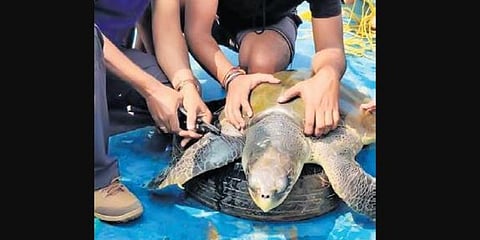

KENDRAPARA: Zoological Survey of India (ZSI) with support of the Forest department has tagged 1,035 nesting sea turtles at the Gahirmatha marine sanctuary over the last one week.
“ZSI will fit tags on 30,000 turtles in the State within five years during the arribada. All the tags are marked with a number issued by ZSI, Kolkata,” said noted biologist and deputy director of ZSI, Kolkata, Dr Basudev Tripathy.
He said such tags were fitted on 35,000 turtles from 1994 to 1998. In 1981, noted turtle researcher Dr Chandrasekhar Kar had tagged some turtles for the first time at Gahirmatha.
“The tags will help track the migratory routes of marine species. Each year more than half a million turtles lay eggs at Gahirmatha as well as Rushikulya. We tagged 400 turtles at Rushikulya recently. Around 2 lakh turtles have already laid eggs within a week at Gahirmatha,” said Dr Tripathy.
Sea turtles are also tagged to achieve recognition of individuals or cohorts for research purposes. Tagging is most often conducted to obtain information on reproductive biology, movements and growth rates.
Sea turtles throughout the world are known to migrate thousands of kilometres between nesting beaches and feeding grounds. Tagging helps biologists to study turtle’s migratory route and areas of foraging.
The data also proves the interconnections of turtle population that navigates from one country’s waters to another.
In the past, biologists had sighted turtles on the same beach where they were tagged. Several tags were recovered from Sri Lanka. In April 2001 for the first time, the Forest department and Wildlife Institute of India had fitted four turtles with Platform Transmitter Terminals (PTTs) at Devi permitting online monitoring of migratory routes.
The PTT-fitted turtles circled the waters and only one migrated south towards Sri Lanka. Unfortunately, all four turtles stopped transmitting within two to four months which could be duee to either technical problems or trawler-related mortality,” said Dr Tripathy In 2007, Forest department had fitted PTTs on 30 turtles and many of them moved towards the seawater of Sri Lanka.